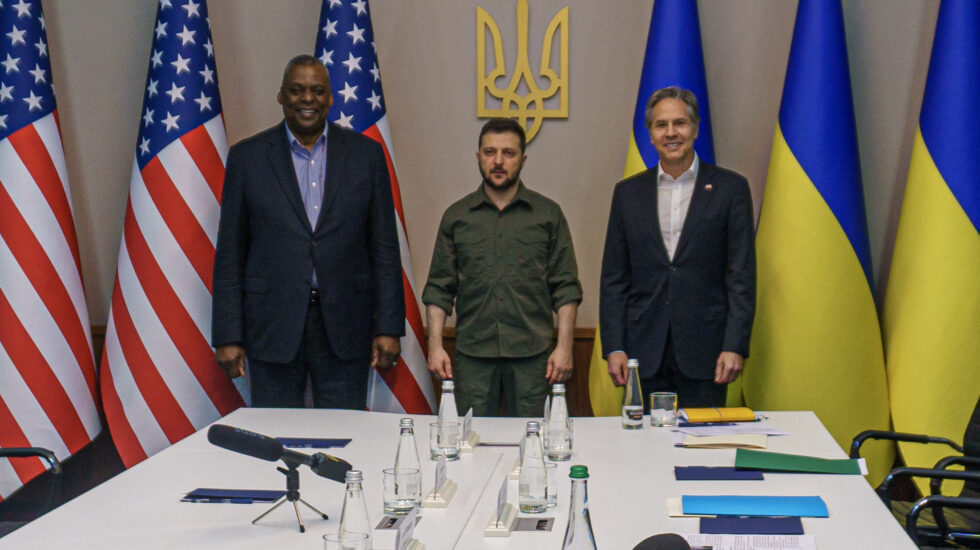Two top officials from the Biden administration – Secretary of State Antony Blinken and Defense Secretary Lloyd Austin – visited Ukrainian president Volodymyr Zelensky in Kyiv on Sunday, a high-profile trip designed to underscore the U.S. commitment to the Ukrainian war effort.
“Russia is failing, Ukraine is succeeding,” Blinken said to reporters in Poland on Monday.
“We don’t know how the rest of this war will unfold, but we do know that a sovereign independent Ukraine will be around a lot longer than Vladimir Putin is on the scene,” he added.
Austin echoed a similar sentiment, saying that Zelensky “has the mindset that they want to win, and we have the mindset that we want to help them win.”
“The first step in winning is believing that you can win,” Austin said. “We believe that they can win if they have the right equipment, the right support, and we’re going to do everything we can … to ensure that gets to them.”
To that end, Blinken and Austin said they told Zelensky that the U.S. has approved a $165 million sale of ammunition and will provide $300 million in foreign military financing. The U.S. has already committed billions of dollars to Ukraine’s defense and has provided high-tech weaponry.
Asked how the U.S. defines success in the region, Austin responded, “we want to see Ukraine remain a sovereign country, a democratic country able to protect its sovereign territory. We want to see Russia weakened to the degree that it can’t do the kinds of things that it has done in invading Ukraine.”
The secretary of defense added: “[Russia] has already lost a lot of military capability and a lot of its troops, quite frankly, and we want to see them not have the capability to very quickly reproduce that capability.”
Blinken and Austin’s trip to Kyiv was shrouded in secrecy. The Associated Press provides the details:
Journalists who traveled with Austin and Blinken to Poland were barred from reporting on the trip until it was over, were not allowed to accompany them on their overland journey into Ukraine, and were prohibited from specifying where in southeast Poland they met back up with the Cabinet members upon their return. Officials at the State Department and the Pentagon cited security concerns.
Blinken and Austin told Zelensky that American diplomats would return to Ukraine for the first time since the invasion began in February.
The Washington Post reports:
Diplomats will begin by making day trips from Poland to Ukraine’s western city of Lviv, where Ukrainians and foreigners have sought shelter from the violence raging elsewhere in the country, a first step to reopening the U.S. Embassy that was shuttered before the invasion, officials said ahead of Blinken’s remarks.
Other nations, including Britain, have announced a resumption of embassy operations in Kyiv, and Blinken said the U.S. Embassy would probably reopen there within weeks.
On Monday, President Biden nominated Bridget Brink to serve as U.S. ambassador to Ukraine.
“Ms. Brink’s nomination will end a delay that career diplomats have said would be baffling even in more tranquil times. The Ukraine ambassadorship has lacked a full-time occupant since 2019, when President Donald J. Trump unceremoniously removed Marie L. Yovanovitch,” reports The New York Times. The outlet adds:
Ms. Brink has been a Foreign Service officer for 25 years, largely focusing on Europe and Eurasia. She was appointed to be the U.S. ambassador to Slovakia by Mr. Trump in 2019 and has served in two other former Soviet republics: Uzbekistan and Georgia.
Meanwhile, the fighting continued as the conflict became two months old over the weekend. The Wall Street Journal reports:
In an attempt to stem the flow of heavy weapons from the U.S. and other allies to the front lines in Ukraine, Russia on Monday hit several Ukrainian railway hubs with missile strikes, severely disrupting rail traffic. Meanwhile, large fires broke out at fuel-storage facilities in the Russian region of Bryansk, some 60 miles from the border with Ukraine, as well as at a nearby military fuel depot, Russian state media said.
Russian authorities said they were investigating the fires at the facilities, which Russian state media said together contained around 15,000 tons of fuel. The blazes erupted less than a month after Russia said Ukrainian helicopters launched strikes that caused a fire at an oil depot in Russia’s Belgorod region, also bordering Ukraine. Russian state media aired security-camera footage on Monday that appeared to show a large explosion followed by a fire.
The Russian missile strikes hit rail infrastructure in the central Ukrainian region of Rivne, local officials said. They followed other missile attacks late Sunday in Poltava that struck an electricity plant and a fuel refinery. The governor of Ukraine’s central province of Vinnytsia said early Monday that Russian missile attacks had hit critical infrastructure in the region and that there were people dead and injured, though he provided no details.



